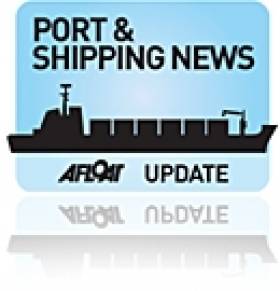Displaying items by tag: Fastnet Race Rambler 100
#PORTS & SHIPPING REVIEW - Over the last fortnight, Jehan Ashmore has reported from the shipping scene, where a brand new multi-purpose heavy-lift vessel Abis Dublin made her maiden 'Irish' call to her namesake port carrying wind-turbine components.
In this year of The Gathering, Dublin Port is to welcome a record number of cruiseships, with more than 100 calls this season to include several new operators.
The fleet of Irish Ferries vessels are taking turns to undergo dry-docking maintenance at the Cammell Laird facility in Birkenhead, where French routes cruiseferry Oscar Wilde is due next month.
The tug that 'righted' the Fastnet Race entrant Rambler 100 in west Cork in 2011, had recently towed a completely different type of vessel, Skerchi, a construction barge to Dublin Port, where the vessel is currently in dry-dock.
Galway Harbour is to welcome The World, the 41,188 tonnes exclusive ultra-luxury residential passenger ship when she opens the 2013 cruise season in July with a two-night anchorage call.
Having operated 12 days of Christmas service, Stena Line's HSS Stena Explorer is taking a break off-service, however, the fastcraft returns for a second year operating a seasonal-summer only schedule.
Shannon Foynes Port Company's draft masterplan "Vision 2041" is to develop port infrastructure and services of the estuary over the next three decades.
Once again the former Dutch dredger Lough Foyle has been contracted by Drogheda Port Company to carry out work at to the mouth of the Boyne.
An extra 3,000 'coach' passengers will have an opportunity to visit Ireland as part of an Irish Ferries initiative worth up to EUR60,000 to promote the nation to UK and overseas tourists.
London 2012, a 82,562 dwt bulk-carrier which after docking at Auginish on the Shannon Estuary, recently weighed anchor offshore of the world famous Ballybunion Golf Course. At the next Olympics of Rio de Janeiro 2016, golf will return to the Games.





























































